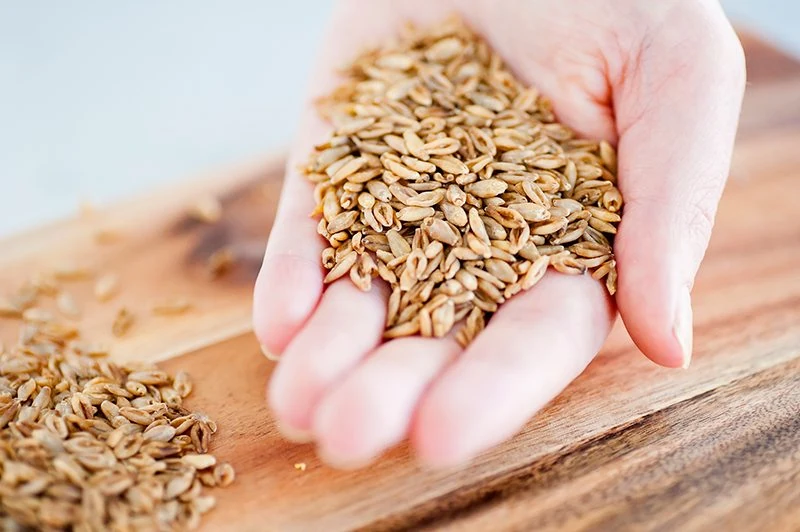In an age of “Facebook Science” where wellness warriors carry more influence than university-trained nutrition scientists, it’s not surprising that the humble wholegrain has been associated with everything from being toxic for your health to bringing a cure for diabetes through strict avoidance.
Like all good myths, stories reign supreme and many people will have heard personal anecdotes from friends and families how removing wholegrains from their diet changed their physical health for the better. Now whilst I love a good story, something I love more when it comes to determining which foods are actually good for my health is scientific evidence rather than beliefs and assumptions. So let’s take a look at the science behind some of the common (mis)perceptions and myths surrounding wholegrains.
Wholegrains cause overweight and obesity

This is probably the most controversial statement, as any nutrition professional worth their degree knows that the disease of obesity is extremely complex and no single type of food can be attributed with the weighty (excuse the pun) status of claiming to be the cause. Whilst there are a number of pseudo-science books that promote this myth, there is a good body of epidemiological evidence that suggests that wholegrains have a beneficial role in body weight regulation (1) and prospective cohort studies support a role for wholegrains in reducing weight gain (2,3,4) . In the Nurses Health Cohort Study, at the 12 year follow up, women in the quintile representing the largest increase in wholegrain intake had a lower weight gain and a 19% reduction in the risk of developing obesity, compared with those in the quintile representing the largest decrease in wholegrain intake (4). In addition to beneficial effects on body weight, wholegrain consumption may be associated with reduced abdominal adiposity. In a subset of studies included in the meta-analysis of Harland et al., the highest wholegrain consumers were determined to have a 2.7-cm lower waist circumference and 0.02 lower waist:hip ratio compared with the lowest wholegrain consumers (5).
And as a final point, most people know that fruits and vegetables can be consumed on a diet focusing on energy deficit. And whilst I don’t want to demonise another great food group, the weight control evidence is stronger for whole grains than it is for fruits and vegetables (3,4,6).
Grains cause your blood sugar levels to spike

There is plenty of research linking many chronic diseases with high GI foods that create big rises and dips in blood sugar levels, and this can result in damage to body systems over long periods. However, virtually all intact wholegrains have a very low GI score and some grains like BARLEYMAX® have a very low glycemic index.
The structure of a wholegrain exerts positive effects on blood glucose levels. The fibre-rich outer bran layer slows down the breakdown of starch into glucose, thereby maintaining steady blood sugar levels rather than causing sharp spikes.
Whilst it is certainly true that refined grains can cause spikes in blood sugar levels, low GI wholegrains like BARLEYMAX® may have a positive effect on glycemic control in patients with Diabetes, and the benefits of low-GI foods are similar to those offered by pharmacological agents that also target postprandial hyperglycemia (7). Researchers conducting a 2013 meta-analysis of 16 studies exploring the association between whole grain intake and type 2 diabetes concluded that “a high whole grain intake, but not refined grains, is associated with reduced type 2 diabetes risk.” They suggest the consumption of at least two servings daily of whole grains to reduce type 2 diabetes risk (8).
Wholegrains cause inflammation
Whole grains are actually part of the solution, not the problem, when it comes to inflammation. Systemic inflammation can fuel many diseases from allergies to heart disease and even cancer, and there have been many a pseudo-scientist who has blamed the finger at wholegrains, despite a number of observational studies showing an inverse association between wholegrain consumption and concentration of inflammatory markers (9).
A report from the Iowa Women’s Health Study linked wholegrain consumption with fewer deaths from inflammatory causes, such as rheumatoid arthritis, gout, asthma, ulcerative colitis, Crohn’s disease, and neurodegenerative diseases. Compared with women who rarely or never ate wholegrain foods, those who had at least two or more servings a day were 30% less likely to have died from an inflammation-related condition over a 17-year period (10).
The protectiveness of wholegrains may be due to an effect on plasma inflammatory protein concentrations and reinforces the public health recommendations that wholegrains be consumed daily as part of a healthy diet.
Whilst myths and pseudo-science will continue to devalue the numerous health benefits that wholegrains offer, as nutrition scientists, it is up to us to continue to lead the way in nutrition research to ensure these valuable foods will deliver the vital nutrients and many benefits to people all over the world.
Teri Lichtenstein APD
References:
- The Role of Whole Grains in Body Weight Regulation. J. Philip Karl, Edward Saltzman. Adv Nutr. 2012 Sep; 3(5): 697–707.
- Dietary intake of whole and refined grain breakfast cereals and weight gain in men.Bazzano LA et al. Obes Res. 2005 Nov; 13(11):1952-60.
- Changes in whole-grain, bran, and cereal fiber consumption in relation to 8-y weight gain among men. Koh-Banerjee P et al. Am J Clin Nutr. 2004 Nov; 80(5):1237-45.
- Relation between changes in intakes of dietary fiber and grain products and changes in weight and development of obesity among middle-aged women. Liu S et al. Am J Clin Nutr. 2003 Nov; 78(5):920-7.
- Whole-grain intake as a marker of healthy body weight and adiposity. Harland JI, Garton LE. Public Health Nutr. 2008 Jun; 11(6):554-63.
- Relationship of fruit and vegetable intake with adiposity: a systematic review. Ledoux TA et al. Obes Rev. 2011;12:e143-50.
- Low-glycemic index diets in the management of diabetes: a meta-analysis of randomized controlled trials. Brand-Milelr J et al. Diabetes Care.2003 Aug;26(8):2261-7.
- Whole grain and refined grain consumption and the risk of type 2 diabetes: a systematic review and dose-response meta-analysis of cohort studies. Aune D et al. Eur J Epidemiol.2013 Nov;28(11):845-58
- Whole grain diet reduces systemic inflammation. A meta-analysis of 9 randomized trials. Yujie Xu, MD et al. Medicine (Baltimore). 2018 Oct; 97(43): e12995
- Whole-grain consumption is associated with a reduced risk of noncardiovascular, noncancer death attributed to inflammatory diseases in the Iowa Women’s Health Study. Jacobs DR, Jr et al. Am J Clin Nutr. 2007;85:1606-14.
Intended as general advice only. Consult your health care professional to discuss any specific concerns.




